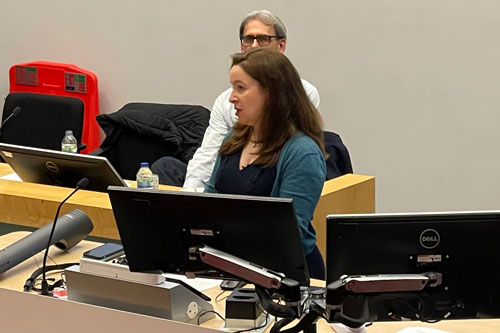A workshop at City, University of London looked back on two years of the first digitally witnessed pandemic and asked how the connections we have made will affect our remembrance
By Chris Lines (Senior Communications Officer), Published
From candlelit vigils and national days of reflection to 'clapping for carers', the coronavirus pandemic has been marked by extraordinary acts of solidarity and collective expressions of emotion.
On Thursday 10 March 2022, City, University of London’s Department of Journalism hosted a full afternoon of speeches and discussion around the theme of how people have connected during the Covid-19 pandemic. The event was titled Connecting in the Time of Covid.
This was the first of three workshops funded by the Higher Education Innovation Fund and convened jointly with the Science Museum on the theme of ‘Commemorating Covid, Remembering Pandemics’.
Digitally witnessed pandemic
The event was organised and chaired by City’s Dr Mark Honigsbaum, a journalist and medical historian specialising in pandemics.
Introducing the event, Dr Honigsbaum noted: “The last two years are everything I’d dreaded yet they have also been fascinating to live through.
"Thanks to Zoom and social media platforms such as WhatsApp and Facebook, we’ve also been able to connect virtually with friends and colleagues even as we’ve been stuck at home and close physical connections have been prohibited.
"But how have these rituals and modes of connecting affected our experience of the coronavirus pandemic, and who is included and who is excluded? And how are these connections likely to shape the remembrance of Covid-19 in years to come?
“This has been the first digitally witnessed pandemic. What if the circle of digital images results in the greying of memory? What if it makes it more difficult to pick out what is significant and meaningful?"
Drawing comparisons with the 1918 influenza pandemic, Dr Honigsbaum said:
“My anxiety is that the pandemic is already being overshadowed by war, just as it was in 1918.
“Let’s use this moment to press the pause button – then we can begin to make sense of this extraordinary moment in social history.”
Angry, impotent, seething
Keynote speaker Dr Rachel Clarke is an NHS palliative care doctor and writer. Her book, Breathtaking, published in January 2021, reveals what life was really like working on NHS Covid-19 wards during the first wave of the pandemic.
In her speech, Dr Clarke spoke with great feeling about the bleak experiences she and her colleagues endured working in a hospice during the early days of the pandemic.
“It’s incredibly important to reflect, remember and learn,” she said. “The last two years have been overwhelmingly difficult”.
Dr Rachel Clarke during her powerful keynote speech
"I realised something devastating in the first week of the pandemic. From the moment a patient came in with Covid, if they succumbed to the disease, they would never see another human face again because every person they saw wore a mask."
Dr Clarke told a moving anecdote about how some little girls turned up in party dresses to visit their sick mother, but the dresses were completely covered up by the adult-size PPE they were subsequently dressed in.
“Seeing them walk off down the corridor, plastic gowns trailing on the ground behind them, was a sight no one should have to see.
“I felt so impotent and seething at the virus that had done this."
The National Covid Memorial Wall
Another speaker, Fran Hall, CEO of the Good Funeral Guide, spoke about losing her husband to Covid-19 the day before his birthday, plunging her into grief.
She became one of the driving forces behind the Covid-19 Bereaved Families for Justice and was the first to draw a heart on the National Covid Memorial Wall, situated across the River Thames from the Houses of Parliament.
“It was important that the political aspect of the Wall was kept low key,” she said.
“The Wall is for and by bereaved people. It’s directly opposite Parliament; decision-makers can look across and remember that decisions have consequences.
“Over a billion people have seen coverage about the wall. We’re now repainting all the hearts with long-lasting masonry paint.
“A community has grown – the wall is a magnet, it’s a place of grief and love and anger.”
An age of forgetting
The second keynote speaker, Professor Andrew Hoskins from University of Glasgow, presented on ‘Forgetting Covid’, with a talk focusing on how societies forget and the politics of memory.
Discussing society’s vast archives of Covid-related social media posts, and the sheer volume of digital memories linked to the pandemic, he said: “Rather than a golden age of memory, we live in an age that is marked by forgetting.”
A recording of the entire event is available here. For a full list of speakers and topics, visit the event webpage.
Details will follow in due course about the two subsequent events in this three-part series.



